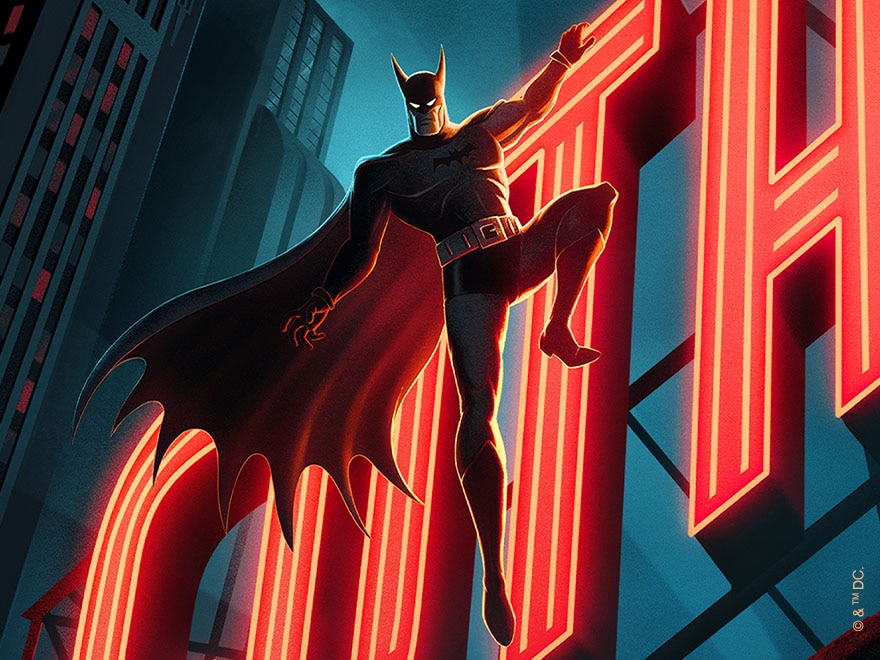Bruce Timm has been one of the defining creative voices behind Batman onscreen over the past thirty years, ever since the debut of Batman: The Animated Series in 1992. After a long hiatus, Timm’s back with Batman: Caped Crusader, an all-new new animated show starring the Dark Knight and his infamous gallery of rogues. Yet, while the Bruce Wayne we saw in Batman: The Animated Series was a seasoned pro when it came to crimefighting, in Caped Crusader he’s much younger and just starting down his path as Gotham’s hero. Relationships with famous allies are still being formed and many of Batman’s most famous villains have yet to emerge. While Caped Crusader continues the noir and 1940s-inspired aesthetics that gave Batman: The Animated Series such a distinctive look, it also has its own identity that the cast of Caped Crusader was thrilled to talk about at San Diego Comic-Con this year.
If you remember, Batman: The Animated Series was where everyone’s favorite psychiatrist in the DC Universe, Dr. Harleen Quinzel, first debuted. Voice actress Arleen Sorkin’s performance rocketed the character into popularity, and it’s difficult to imagine the state of the DC Universe across comics, movies, television and video games without Harley in it today.
Unsurprisingly, Batman: Caped Crusader introduces its own take on Quinzel, voiced by actress Jamie Chung. In Caped Crusader, Chung’s Dr. Quinzel is Bruce Wayne’s psychiatrist and is determined to scope out whether or not his playboy antics are just a performance or his true personality. In Caped Crusader, we’re seeing Dr. Quinzel with the Joker is nowhere in sight (at least, not yet). Harleen holds her own as a character in her own right, who doesn’t need to be defined by her relationship to one of the biggest villains in the DC Universe.
For her part, Chung seems excited by the challenge of creating something different.
“Growing up in the nineties, all we did was watch Batman: The Animated Series and X-Men: The Animated Series,” she says. “G.I. Joe, Sailor Moon, you had all the resources available to you, especially with Arleen Sorkin paving the way for all the other Harley Quinn adaptations and live-action versions.”
But after Chung studied Sorkin’s performance and stepped in the recording booth, the team of Caped Crusader said, “Oh, we don’t want that.” To find her own take on Dr. Quinzel, Chung would lean heavily on the vocal training she’s undertaken over the past few years.
“During covid, I took all these vocal lessons,” she shares. “I hate singing. I hate karaoke, but I forced myself to do it because it really helps with different registers. So, just learning [the differences] between the head voice and the chest voice, I really got to use the range with this character.”
The end result is that Caped Crusader’s Dr. Quinzel is imbued with a different timbre and resonance than Arleen Sorkin’s original version, but still has a recognizable “fun essence” that’s at the core of the now-beloved character.
Speaking of vocal performance and training, Hamish Linklater, who voices Bruce Wayne and Batman on Caped Crusader, has a background in Shakespeare—someone whose most iconic characters are often brooding, nuanced men with a certain dramatic flair much like a certain cowled superhero we all know.
“There are a lot of rules for speaking blank verse well,” reveals Linklater, in reference to the form that Shakespeare’s plays are written in. “And one of the big ones is, ‘Don’t f***in’ sing it, it sings by itself.’”
For Linklater, the “beautiful” animation and storytelling of Caped Crusader acted as the “blank verse” that already sung for itself by the time he stepped into the vocal booth.
“I think, if anything, my experience in classical theater is to take your food off the gas and let the car drive,” he says with a playful dramatic emphasis.
Linklater was not the only member of the cast enamored by the beauty of the storytelling in Caped Crusader. Actress Minnie Driver voices Oswalda Cobblepot on the show, a female take on the Penguin. In crafting her own distinct voice for Oswalda, much different from the ones we’ve seen from Danny Devito in Batman Returnsand Colin Farrell in The Batman, Driver found inspiration in the wryness and strength of actresses like Mae West and Marlene Dietrich.
For Driver, one of the things she treasured most about voicing the Penguin is that there was a sense of “integrity” in Caped Crusader, which she searches for in projects.
“It wasn’t just, ‘Oh, do a funny voice,’ and the Penguin walks like a penguin,” she explains. “There was something else going on in there, and I could feel how much they wanted this character to evolve. And I loved that because it’s really something to grab onto. You’re not copying anything, you’re inspired by things, but you’re also creating something new that’s real.”
Driver’s words perfectly sum up Batman: Caped Crusader as a show. It’s not tethered to what Batman: The Animated Series originally accomplished, but rather is an evolution of Bruce Timm’s work and his interpretation of the Batman mythos. Part of what makes comic books so compelling for fans is the evolutionary nature of their storytelling. Creators build off of each other, constantly reimagining and reinterpreting the status quo, over the course of several decades. In this sense, Batman: Caped Crusader is an apt reflection of everything we love about loving Batman.
All ten episodes of Batman: Caped Crusader are now streaming on Prime Video.

